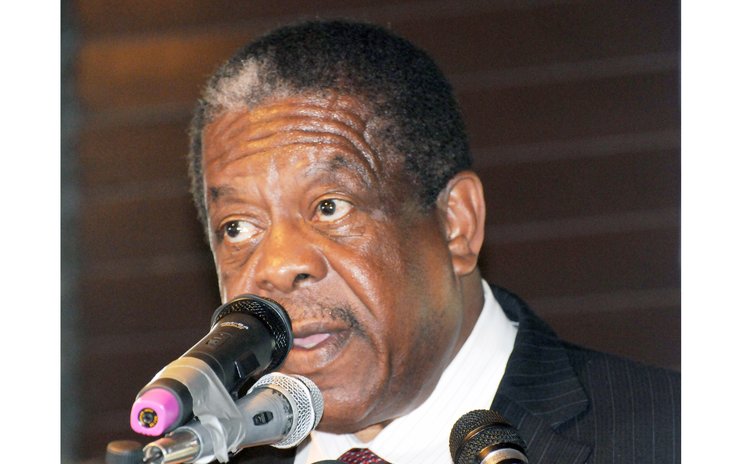Delays in the acceptance of the Caribbean Court of Justice by regional states: It's been a Caribbean thing since the West Indies Federation

With the ruling in the case Warrington vs the Dominica Broadcasting Corporation, Dominica directly felt the impact of the court for the first time since the nation became the fourth CARICOM country to recognise the CCJ as its final court in March 2015.
The Warrington judgement last week was preceded by another popular decision in November when the CCJ ruled that a law in Guyana, which makes it a criminal offence for a man or a woman to appear in a public place while dressed in clothing of the opposite sex for an "improper purpose", is unconstitutional.
But despite its many laudable benefits, the majority of Caribbean countries, including regional giants Jamaica and Trinidad continue to snub the CCJ.
The situation reminds us of the insular but famous statement of Dr. Eric Williams, the then Premier of Trinidad and Tobago that, "One from ten leaves nought", referring to the withdrawal of Jamaica and signifying and justifying his decision to withdraw Trinidad and Tobago from the Federal arrangement a short while later. That was in 1962. But since then Caribbean institutions have struggled, including The University of the West Indies, to stay alive after difficult births. The CCJ is no exception.
Undoubtedly, you have not forgotten the recent failure of referenda in Antigua and Barbuda and Grenada, for having the CCJ as their final appellate court. Grenada has now failed twice. Persons who have been opposed to the establishment of the CCJ have always expressed fears that party politics would eventually interfere with the operations of the CCJ. That is one of the main reasons why only a few countries of the Caribbean have accepted the CCJ as their final court of appeal. But the failure of Caribbean countries to accept their own institutions appears to be the major problem and politics plays a large part.
Recall that the agreement establishing the CCJ came into force on 23 July 2003.The court was inaugurated on 16 April 2005 in Port of Spain, Trinidad & Tobago which is also the seat of the Court. At the moment only Dominica, Guyana, Barbados and Belize have completely accepted the CCJ.
The CCJ is intended to be the court of last resort and has exclusive jurisdiction in respect of the interpretation and application of the Treaty of Chaguaramas, the original agreement setting up the Caribbean Single Market and Economy (CSME).
In addition, the CCJ hopes to be the final court of appeal for CARICOM member states, replacing the Judicial Committee of the Privy Council (JCPC) for Anglophone member states. In the exercise of its appellate jurisdiction, the CCJ hopes to hear appeals from common law courts within the jurisdictions of parties to the agreement establishing the CCJ, and will be the highest municipal court in the region.
But the governments of Trinidad and Tobago and Jamaica have failed to decide on its position as far as the CCJ is concerned. For example, a Trinidad prime minister once said the country was being cautious and would wait and consider the "quality of their (CCJ) decisions in deciding the future course of our judicial system". This, we suggest, is rather ingenious; Jamaica and Trinidad have always had problems identifying with small islanders, even in cricket.
Though the people of the Caribbean may be forced, from time to time, to reflect on their commitment to regional institutions, we believe the region must give due consideration to the larger picture. Without the CCJ, the CSME would essentially be crippled and its foundation would collapse. On the other hand, as a replacement for the Privy Council of England, the CCJ is absolutely crucial since Britain has clearly indicated it intends to sever that umbilical cord.
Early on in its life the CCJ faced serious tests that could have crippled its future. Firstly, there were serious implications for the CCJ because of the treatment of Tommy Lee Sparta who was denied entry into Dominica in 2014. You will recall that Tommy Lee was scheduled to perform in Portsmouth but he was denied entry at Melville Hall airport and detained at the Marigot Police Station.
Recall too that Shanique Myrie claimed that on 14 March 2011, she was allowed entry at the Grantley Adams International Airport in Barbados for one month when her passport was stamped, and that two hours later she was taken by a female immigration officer to a bathroom where she was allegedly finger raped, abused with foul language, threatened and then denied entry.
The government of Barbados was accused of violating its obligations under the Revised Treaty of Chaguaramas and a Caribbean Community (CARICOM) Heads of Government decision in 2007. Myrie's lawyers argued that their client denial of her right of entry was unjustifiable, arbitrary and discriminatory. But lawyers for the Barbados government argued that it upheld the position of the immigration authorities that its officers had acted in accordance with the law and regulations.
In the end the CCJ awarded Myrie BD$77, 240, to be paid by the Barbadian government, for the Jamaican's wrongful denial of entry into Barbados.
The cases that we mentioned above illustrates that the CCJ is a breath of fresh air for justice in the Caribbean but we continue to act as if our judges are not good enough. Is this mental slavery?




